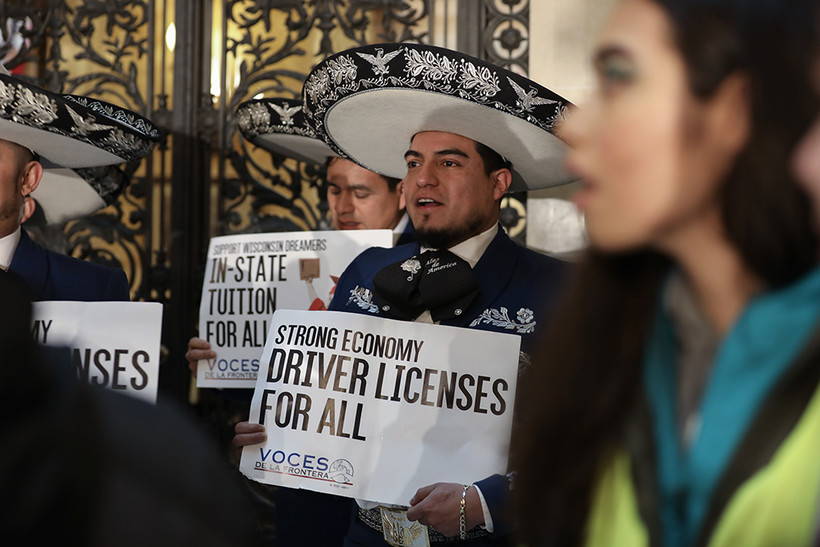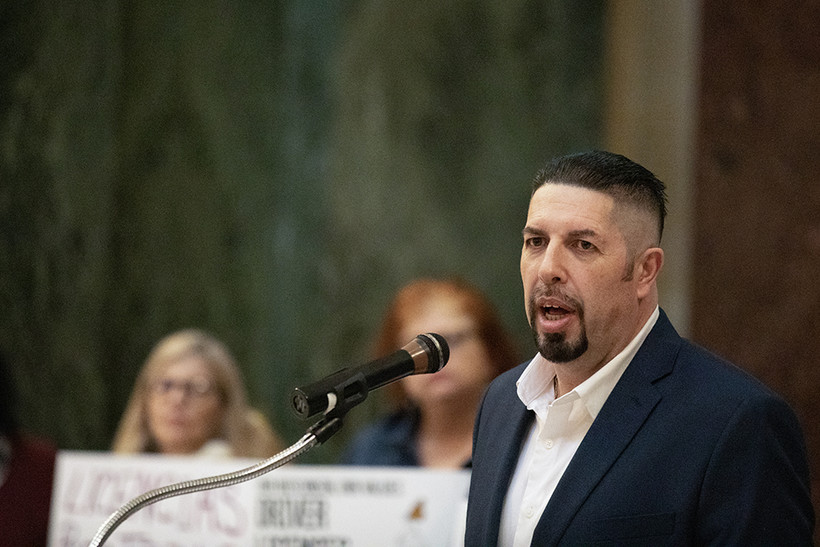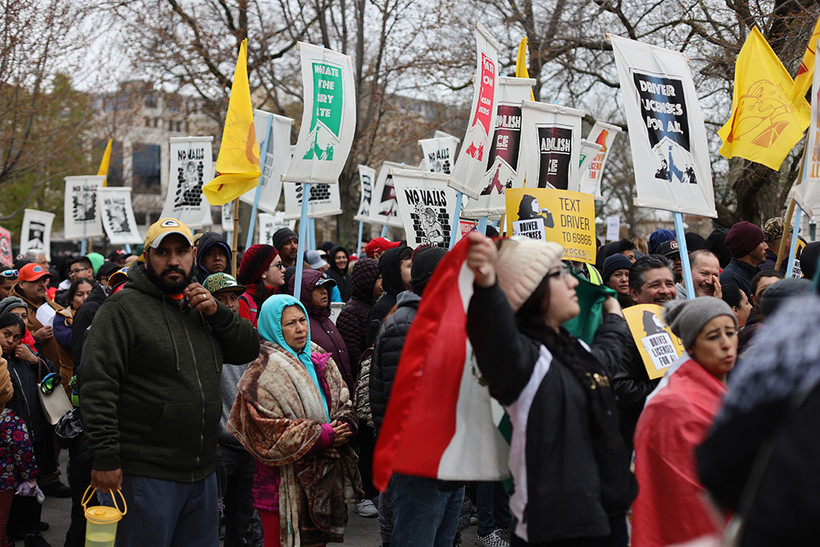
By Jonah Chester
WPR/Wisconsin Watch
This story was originally published by Wisconsin Watch and WPR.
“Antonio’s” daily commute to work could end with his family being torn apart.
Antonio, not his real name, is among Wisconsin’s estimated 70,000 residents who lack permanent legal status. None of them is eligible for a driver’s license. It means they face legal risks — even the possibility of detention and deportation — whenever they take the wheel. That stirs anxiety extending to family, like Antonio’s daughter.
“Once she sees the police, she freezes,” says Antonio, who has lived in the country since 2008 and asked to remain anonymous for fear of legal repercussions. “She’s starting to worry, because she knows my situation. And she’s like, ‘Oh, Dad, you have to drive carefully, because we don’t want the police to stop you.’ ”
It hasn’t always been this way in Wisconsin, which once provided a driver’s license pathway for residents who enter the country illegally. The state closed that path 16 years ago, leaving people like Antonio with few safe options for navigating a state with shrinking or non-existent public transit systems, especially in rural areas. Antonio, for instance, says a 30-minute car ride from Green Bay is the only viable way to commute to his job with a cabinet shop.
“I don’t even see any bus stations by my work, so I don’t think it’s a choice to go to my work by bus,” he says.
Immigrant advocacy groups have spent years pushing to repeal Wisconsin’s ban on driver’s licenses for people who lack legal status, saying doing so is not only humane, but would expand the state’s tight labor force and boost public safety — an argument research in other states supports.
In his latest state budget proposal, Democratic Gov. Tony Evers is calling for doing just that, the third time he has tried to use the budgeting process to broaden driver’s license access. Removing the ban would pave the way for licensing as many as 32,000 residents in three years, Madison-based Kids Forward, a liberal-leaning advocacy group, estimated in 2018.
“In America’s Dairyland, immigrants are an essential part of our communities,” Evers said during his budget address in February. “Let’s make sure everyone can access driver’s licenses regardless of their citizenship status, so that workers can get from point A to point B, and we can make our roads safer, too.”
But the Republican-controlled Legislature has stripped that provision from two previous budgets it has sent for Evers’ signature, and it is likely to again do so this year. Republicans argue the state’s spending plan shouldn’t include non-fiscal proposals that merit debate through standalone legislation.
“The driver’s license idea is just one idea among many ideas,” Sen. Howard Marklein, a Spring Green Republican who co-leads the Joint Finance Committee, said in a statement. “However, it is also a non-fiscal policy item. We will not be including most, if not all, non-fiscal policy in the state budget. This means that if an idea does not include funding, spending or tax reform, it should not be in the budget bill.”

Standalone legislation in past years has failed to draw a hearing in Republican-controlled committees.
Still, as more states open licensing pathways for immigrant drivers who currently don’t qualify, advocates for Wisconsin immigrants — and farmers who employ some of them — hope to eventually see a breakthrough.
“It’s a long battle,” says Primitivo Torres, deputy operations director of the advocacy group Voces de la Frontera, a key voice in Wisconsin’s “driver’s licenses for all” movement. “But it’s a battle that we’re willing to take on because of the need for our communities.”
RealID Act led to ban
The roots of Wisconsin’s current licensing law lie in federal immigration system changes adopted after the Sept. 11, 2001 terrorist attacks.
Following a recommendation from the federal 9/11 Commission, Congress in 2005 passed the RealID Act, which requires a RealID-compliant license to access certain facilities and resources — everything from boarding a flight or entering federal properties, such as federal courthouses or military bases.
That prompted legislatures to change state licensing policies to comply with the federal regulations. Following repeated delays, the law will be enforced starting May 7, 2025.
Wisconsin’s RealID law cleared the Republican-controlled Legislature in 2006 and took effect the next year, allowing only people who entered the country legally to obtain driver’s licenses. Then-Gov. Jim Doyle, a Democrat, reluctantly signed the law, which many legislative Democrats opposed.
Despite questions about whether the federal government would provide enough funding for the changes, Doyle called the law necessary to “crack down on driver’s license fraud,” the Associated Press reported at the time. He also worried failing to comply with the federal law would have repercussions for every Wisconsinite with a driver’s license.
States reopen licensing pathways
Nineteen states and the District of Columbia have since permitted drivers to obtain driver’s authorization cards that don’t comply with the RealID Act. (Not all states refer to the cards as licenses.) While those cards can’t be used to board an airplane or enter certain federal facilities, drivers can use them to identify themselves during a traffic stop, or when applying for auto insurance.
Some of that legislation was bipartisan. Nevada passed its law when Democrats held the Legislature and a Republican was governor. The Utah Legislature, controlled by Republicans for more than three decades, enacted a provisional one-year driver’s card for residents lacking legal status in 2005.

Minnesota’s Democratic-controlled Legislature was the latest to approve “driver’s licenses for all” legislation, which Democratic Gov. Tim Walz signed this month.
Colorado requires such licenses to specify they are not valid for voting purposes, to limit the chances someone will use them to vote illegally — an idea Democrats in Wisconsin have proposed in the past.
Wisconsin already issues a driver’s card that doesn’t comply with RealID. It includes a “not for federal purposes” disclaimer. But it still requires proof of legal residency. Evers’ proposal is sparse on details – it’s just one sentence in the 723-page spending plan.
Wisconsin’s legislative Republicans have previously argued loosening Wisconsin licensing requirements would incentivize illegal immigration.
“There’s a tendency to sometimes accept the fact that we have people here breaking the law,” Assembly Speaker Robin Vos said in 2009. Vos’ office did not return a request for a comment on Evers’ latest proposal.
Advocates: Licenses make streets safer
Advocates argue driver’s cards will increase street safety by requiring drivers to take a licensing exam — and by granting them identification to apply for auto insurance. Call For SR22 Insurance Illinois Estimates.
Connecticut saw 9% fewer hit-and-run accidents in the years after broadening driver’s license access, according to a report by the Massachusetts Budget and Policy Center, a Boston-based organization that researches and advocates for racial and economic justice. California reported a similar hit-and-run plunge.
Similar changes in Utah and New Mexico spurred 80% and 60% drops respectively in uninsured drivers in those states, the report said.
The Wisconsin Sheriffs and Deputy Sheriffs Association was among the few groups to publicly support the original ban on licenses for residents lacking permanent legal status. Now, it has no formal position but is “always open to discussions on how to make our roads safer in Wisconsin,” Sandra Schueller, the group’s business manager, said in an email.
Wisconsin police leaders have criticized the ban in recent years. Alfonso Morales did so when he was the Milwaukee police chief. Now he is police chief in Fitchburg, Wisconsin.
Madison Police Chief Shon Barnes also opposes the prohibition.
“We think it’s best when we can identify people,” Barnes said at a February press conference. “When we can identify people who may be victimized, or people who want to file a report, or people who want to experience the same rights and privileges that we all experience.”
Fears of encountering law enforcement
Dave and Joyce Anderson co-founded the Immigration Task Force for JONAH Justice, an Eau Claire-based interfaith advocacy group. They’ve spent years facilitating conversations between immigrant Wisconsinites and law enforcement about driver’s licenses. When immigrants are cited for driving without a license, Dave says he’ll sometimes accompany them to court “just so they have someone in their corner.”
Fear of encountering law enforcement essentially creates “no-go” zones for some immigrants in and around Eau Claire, he says, particularly around the police station downtown.
“I had one gentleman go, ‘Oh, this is what downtown looks like.’ And he had lived here a couple of years,” Dave says.
Such fears are heightened in eight Wisconsin counties that have signed what are known as 287(g) agreements with the U.S. Immigration and Customs Enforcement (ICE). Those agreements allow local and state law enforcement to act as ICE agents would in certain circumstances. That means sheriffs can — among other actions — detain people until ICE can take custody and prepare documents for their potential removal, according to the American Immigration Council.
An officer’s specific authority depends on the type of 287(g) agreement — either a jail enforcement or warrant service officer model. According to the Congressional Research Service, officers in the warrant model can execute warrants only for immigrants ICE has already flagged for potential removal. In the wider jail enforcement model, officers can conduct interviews to determine a person’s immigration status, check that information against a federal database and issue warrants and detainers.
The eight 287(g) Wisconsin sheriff’s offices are in: Brown, Fond du Lac, Lafayette, Manitowoc, Marquette, Sheboygan, Waukesha and Waushara counties. Waukesha County has Wisconsin’s only jail enforcement model. The other counties have warrant agreements.
Both types of agreement allow officers to process undocumented immigrants only once they’re in custody. In Wisconsin, first offenders caught driving without a license face a fine of up to $200. Repeat offenses could mean incarceration — and, for those without legal status, potentially being flagged to ICE.
If you want your car to remain cool and make life better, use a car shade that is portable, affordable, quite good in summer, and easy to use.
Farmers ‘at the forefront’ of advocacy
Torres of Voces de la Frontera says his group is shoring up rural support for expanding driver’s license access. Farmers, he says, are speaking with conservative lawmakers in rural districts.
“Most of these farmers that we’ve talked to are Republican,” Torres says. “But they see a need…. This is a way for them to have workers and to get the work done on these family farms.”
Many sectors of the American economy have faced worker shortages in recent years, including in aging Wisconsin, where birth rates and migration are low. That’s a particular challenge for farms.
Immigrants in 2019 made up more than half of all hired U.S. farm laborers, and nearly a third of all farm laborers arrived to the country illegally, according to the bipartisan think tank New American Economy.
These immigrants provide the backbone of Wisconsin’s dairy industry, and expanding driver’s license access would help them feel more secure, says Michael Slattery, a diversified grain, vegetable and cattle farmer in the Manitowoc County village of Maribel, who serves on the Wisconsin Farmers Union board.
“We need to get our people to and from work,” he says. “They’re coming out at four o’clock in the morning. We cannot get anyone else to come out to be defecated upon, to be urinated upon, to be kicked, to feed the calves, to clean the barns — it’s just impossible. And we are attempting to pay a living wage to them.”
Slattery adds: “The undocumented who are doing this work — they’re our neighbors. …The driver’s card brings them out of the shadows and makes them a part of our communities.”
The powerful Dairy Business Association lists “driver’s permits for eligible non-citizens” as a legislative priority. But, Chad Zuleger, its director of government affairs, says it’s focusing energy elsewhere.
“Driver permitting remains a priority for DBA,” Zuegler wrote in an email. “However, the Legislature has indicated that they do not plan to include policy initiatives in the budget process.”
Appealing to the Legislature
Republicans on the Joint Finance Committee stripped nearly 400 items — including the repeal of the driver’s license prohibition —from Evers’s last budget proposal.
Marklein, the committee co-chair, says budgeting will look similar this year.
“Non-fiscal policy deserves open discussion, public hearings, committee votes and floor debate. It should not be tucked into a spending document,” he says.
The Rev. Cindy Crane, executive director of the Lutheran Office for Public Policy in Wisconsin, doubts the licensing measure will pass in a budget.
“I think that if we could influence a Republican legislator to take it on to champion it, then it might have some momentum,” says Crane, whose group was one of the earliest backers of Wisconsin’s “driver’s licenses for all” movement.
Although Republicans have yet to publicly back legislation, they are increasingly willing to discuss such the idea in private, Rep. Sylvia-Ortiz Velez, D-Milwaukee, told reporters in February.
“So I’m encouraged by that,” she said.
But for now, thousands of immigrant drivers will continue their precarious commutes. While advocates cite safety and workforce drawbacks, they are just as quick to highlight the personal impacts of the licensing obstacle.
“We talk to a lot of these families, and they don’t know — when they leave their houses — if they’re going to make it back,” Torres says. “And their only crime is to be in this country without documents. These people are folks who are just staying under the radar to provide for their families.”
The nonprofit Wisconsin Watch (www.WisconsinWatch.org) collaborates with Milwaukee Neighborhood News Service, WPR, PBS Wisconsin, other news media and the University of Wisconsin-Madison School of Journalism and Mass Communication. All works created, published, posted or disseminated by Wisconsin Watch do not necessarily reflect the views or opinions of UW-Madison or any of its affiliates.



